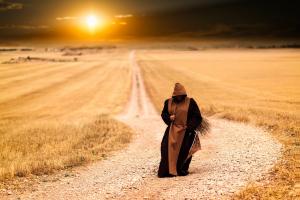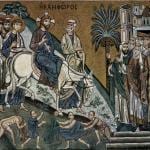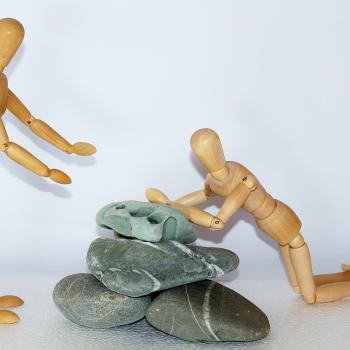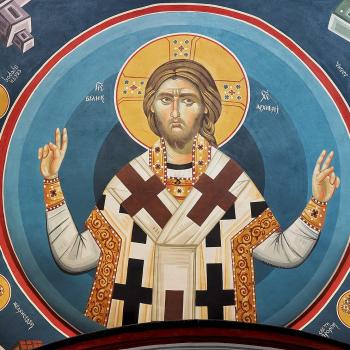
The desert fathers and mothers wanted to establish a utopian like community in the desert. However, they were also human. When someone entered the growing monastic community, they brought all the foibles of humanity with them. This meant that the monastic community had to deal with many of the same problems as secular society. People, even those who love and care for each other, often can get on each other’s nerves. Minor differences of opinion can become the foundation for great strife and conflict. While some of the monks and nuns lived together, trying to help each other as they strived for perfection and others desired to live alone, rarely seeing others outside of times of worship, none of them could get entirely away from the problems of the world. Because of this, they had to find strategies to help be at peace with each other.
The various collections of sayings associated with the desert fathers and mothers show us many of the lessons they learned as they strove for spiritual perfection. Some of those lessons serve best for those within similar communities, that is for others following the monastic vocation, but many of them are applicable for all of us. This is especially true in regards the warnings they gave against judging others.
It is easy to see how a community of monks and nuns, each trying to outdo everyone else in their ascetic practices, could begin to judge each other based upon their external accomplishments. One of the great temptations of those who are spiritually inclined is pride. This is especially true for those just beginning their spiritual journey.
We often begin as idealists full of vigor who hardly have experienced the trials and tribulations of life. We think everything is easy because, at first, everything is. If people are not like us in zeal, if people are not like us in what they do, we begin to think something is wrong with them. This, of course, turns us away from our own needs, as we focus on others rather than on our own development. In the desert community novices received lessons from the spiritual fathers and mothers who came before them about how such idealism often leads spiritual aspirants astray. But it was not always novices who needed to learn this. Sometimes, elders always needed to be reminded of this important point. This was likely the case with the following saying associated with Abba Isaac:
One day Abba Isaac went to a monastery. He saw a brother committing a sin and condemned him. When he returned to the desert, an angel of the Lord came and stood in front of the door of his cell, and said, ‘I will not let you enter.’ But he persisted saying, ‘What is the matter?’ and the angel replied, ‘God has sent me to ask you where you want to throw the guilty brother whom you have condemned.’ Immediately he repented and said, ‘I have sinned, forgive me.’ Then the angel said, ‘Get up, God has forgiven you. But from now on, be careful not to judge someone before God has done so.’[1]
As he was already acknowledged as an elder, that is, as an Abba, Isaac had already achieved some level of spiritual discipline. But some of the basics of that discipline apparently was forgotten. He did not remember that the point of asceticism was to struggle against his own vices. He wanted mercy for himself, but he did not consider that need for others. It was for this reason why, when he showed no mercy to another monk who committed some fault (we do not know what that fault was), Isaac found himself conflicted. He was not able to return to his monastic cell. He had not yet developed the charitable heart which he needed to be a truly great spiritual master. He recognized his own irritability and anger as being sinful. If he wanted God to condemn his fellow ascetic for their sin, then God would have to condemn him for his. When he thought about it, he thought about how he did not want to be condemned to hell and yet he should be in accordance to the judgment which he had given to the other monk. When he realized what he had done, he broke down and repented. He learned that it is not up to any one of us to determine the fate of others, to condemn them before their time. He learned that it was not up to him to judge; to be a monk was to live a life of penance, something which meant he should not be standing in judgment of others.
Is this not true for all of us? Are we not called to a life of metanoia? Why, then, do we judge others and condemn them so quickly? We might try to say that this is not what we are doing. We might try to justify ourselves by saying we are just judging their actions, but is that really what we are doing? Would we want to be judged so freely for all our sins? Surely, as we experience forgiveness from God, we should realize that God’s grace and love goes beyond his judgment. If God is willing to free us from our guilt instead of letting us suffer inalterable condemnation, then we should likewise have patience with others, granting them mercy rather than wishing them perdition.
This is why St. Peter of Damaskos warns us that those who are judgmental in their attitude towards others ignore (or reject) the value of grace:
If those attacked by many passions of soul and body endure patiently, do not out of negligence surrender their free will, and do not despair, they are saved. Similarly, he who has attained the state of dispassion, freedom from free and lightness of heart, quickly fall if he does not confess God’s grace continuously by not judging anyone. Indeed, should he dare to judge someone, he makes it evident that in acquiring his wealth he has relied on his own strength, as St. Maximos states. [2]
When we think we are doing well in our spiritual walk, when we think we have gained the strength to walk on our own, we have a tendency to ignore God and his grace in our lives. We act as if we can accomplish anything all by ourselves. And if we think we can do it, then we think others can as well. If they don’t, we condemn them. But the truth of the matter is that we cannot do it by ourselves. Even when we might attain some level of discipline in our lives, God is there propping us up, helping us to achieve whatever successes we have achieved. When we realize and keep in mind that we need God to be with us for even those things we can do best, we should be able to realize why others, likewise, need God and his mercy. As we would not want them to judge us for our need, so we should rest judging them for theirs:
A brother asked the same old man [Abba Euprepius], ‘How does the fear of God dwell in the soul?’ The old man said, ‘If a man is possessed of humility and poverty, and if he does not judge others, the fear of God will come to him.” [3]
Indeed, this is why we are told we will be able to be saved only when we love our neighbors as ourselves, doing them no harm, including and especially the harm which is done by a condemnatory spirit:
Abba Paphnutius, the disciple of Abba Moses said, ‘I asked my Father to say a word to me and he replied, “Do no evil to anyone, and do not judge anyone. Observe this and you will be saved.’”[4]
A different desert father, Xanthias, said that this this made dogs better than him, because they did not judge others the way he did:
The same abba [Xanthias] said, ‘A dog is better than I, for he has love and does not judge.’ [5]
To be sure, there are times and places in which judgments are necessary. But it must be done by people with rightful authority and with wisdom. Thus, Abba Macarius told Pachomius of Tabennisi that those who have been given judicial authority should judge justly, but those without such authority must leave judgment to others, and ultimately, to God:
Abba Macarius went one day to Abba Pachomius of Tabennisi. Pachomius asked him, ‘When brothers do not submit to the rule, is it right to correct them?’ Abba Macarius said to him, ‘Correct and judge justly those who are subject to you, but judge no-one else. For truly it is written: “Is it not those inside the church whom you are to judge? God judges those outside.” ‘ (1 Cor. 5.12-13). [6]
The wisdom of the desert follows what is found in Scripture. For Scripture consistently tells us to be careful and not judge others:
Do not speak evil against one another, brethren. He that speaks evil against a brother or judges his brother, speaks evil against the law and judges the law. But if you judge the law, you are not a doer of the law but a judge. There is one lawgiver and judge, he who is able to save and to destroy. But who are you that you judge your neighbor? (Jas. 4:11-12 RSV).
We must not presume authority for ourselves. We must not think we are meant to judge. Rather, we must lift each other up even as we humbly look after ourselves and work out our own salvation with much fear and trembling. We should not presume to judge others; if we are to judge, we should judge ourselves and ask for God’s mercy. When we presume to judge others, we fail the path of love, close ourselves from God’s mercy, and so lead ourselves to our own condemnation:
Therefore you have no excuse, O man, whoever you are, when you judge another; for in passing judgment upon him you condemn yourself, because you, the judge, are doing the very same things. We know that the judgment of God rightly falls upon those who do such things (Rom. 2:1-2 RSV).
If we see someone who is weak, someone who stumbles and falters, we should show them our love, lifting them up, sharing their burden if at all possible:
Brethren, if a man is overtaken in any trespass, you who are spiritual should restore him in a spirit of gentleness. Look to yourself, lest you too be tempted. Bear one another’s burdens, and so fulfil the law of Christ (Gal. 6:1-2 RSV).
The law of Christ is the love of love. We should be like dogs, who, seeing people who are sick and wounded, will go to and show them love. When we look to others trying to find ways to judge them, we have abandoned the path of love. We do not show any sense of humility. We do not show the proper understanding of God’s grace and mercy. By judging them, we close ourselves from love. When we close ourselves from love, we cannot find salvation for God is love. “For this is the message which you have heard from the beginning, that we should love one another” (1Jn. 3:11 RSV). Without such love, we do not have the life of Christ in us. “We know that we have passed out of death into life, because we love the brethren. He who does not love abides in death” (1Jn. 3:15 RSV). And without the life of Christ in us, we will not receive the grace which we need to attain eternal life.
Christ, in his great love for us, does not seek to judge us, but to save us (cf. Jn. 3:17). He will not render his judgement before its proper time. We should follow is example. When we go into the world, our goal should not be to act as a judge seeking to destroy everything around us for being less than we would like it to be, but to be a companion with Christ, sharing his love with all.
The desert fathers had to learn how to be with each other. To properly establish their community, they needed to work together This would not be possible if each, in their pride, thought their way and desires should be the foundation for the community. They came to understand that their community must be founded upon Christ and his grace. That is, it must be founded on the law of Christ, the law of love. Such love, when it is acted upon, could and did bring the community together and help those within to find their salvation. But when they lost, when petty rivalries got the best of them, the community floundered because it no longer resembled what it was meant to be.
[1] The Sayings of the Desert Fathers. Trans. Benedicta Ward (Kalamazoo, MI: Cistercian Publications, 1984), 109-110.
[2] St. Peter of Damaskos, “A Treasury of Divine Knowledge” in The Philokalia: The Complete Text. Volume Three. Trans and ed. G.E.H. Palmer, Philip Sherrard and Kallistos Ware, et. al. (London: Faber and Faber, 1984), 160 [“That we should not despair even If we sin many times”].
[3] The Sayings of the Desert Fathers, 62.
[4] The Sayings of the Desert Fathers, 133.
[5] The Sayings of the Desert Fathers, 159.
[6] The Sayings of the Desert Fathers, 152.
Stay in touch! Like A Little Bit of Nothing on Facebook.
If you liked what you read, please consider sharing it with your friends and family!
















